NIT6130 Introduction to Research: Methodology Selection for E-Learning
VerifiedAdded on 2024/06/03
|12
|2222
|118
Report
AI Summary
This assignment focuses on developing suitable research methodologies for a thesis on the effectiveness of online learning. It begins by identifying research problems and sub-problems based on collected literature, specifically addressing technical issues and time management challenges faced by e-learners. The report discusses qualitative and quantitative methodologies, ultimately advocating for a mixed-method approach. Existing methodologies are reviewed, focusing on technical issues as a key sub-problem, and analyzed for their relevance. The proposed methodology involves a combination of quantitative (surveys) and qualitative (literature review) methods to gather comprehensive data and insights. The framework includes conducting surveys, testing the data, and presenting final solutions, while also acknowledging the benefits and limitations of the chosen approach. The goal is to select an effective methodology that leads to definite conclusions about the research problem.
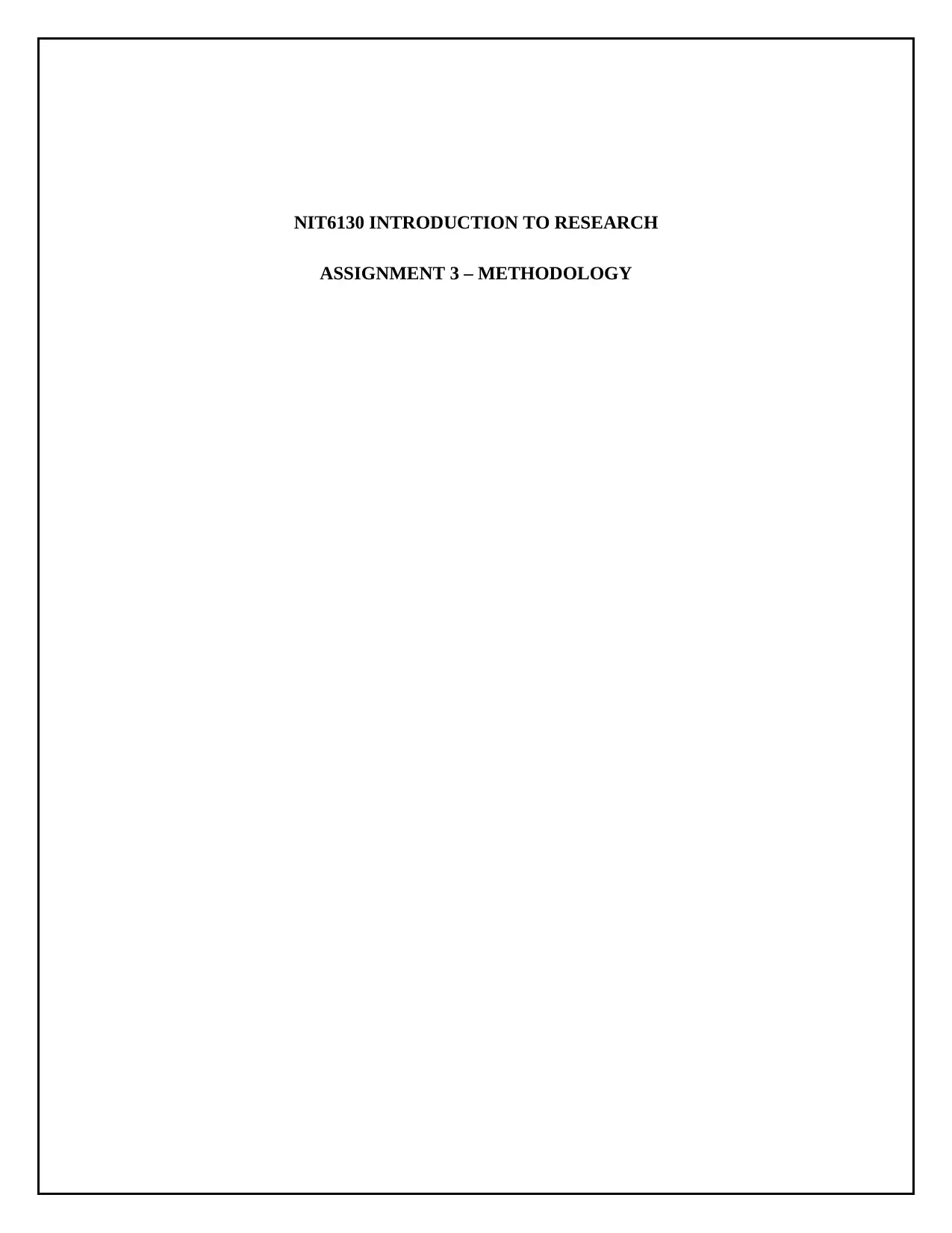
NIT6130 INTRODUCTION TO RESEARCH
ASSIGNMENT 3 – METHODOLOGY
ASSIGNMENT 3 – METHODOLOGY
Paraphrase This Document
Need a fresh take? Get an instant paraphrase of this document with our AI Paraphraser
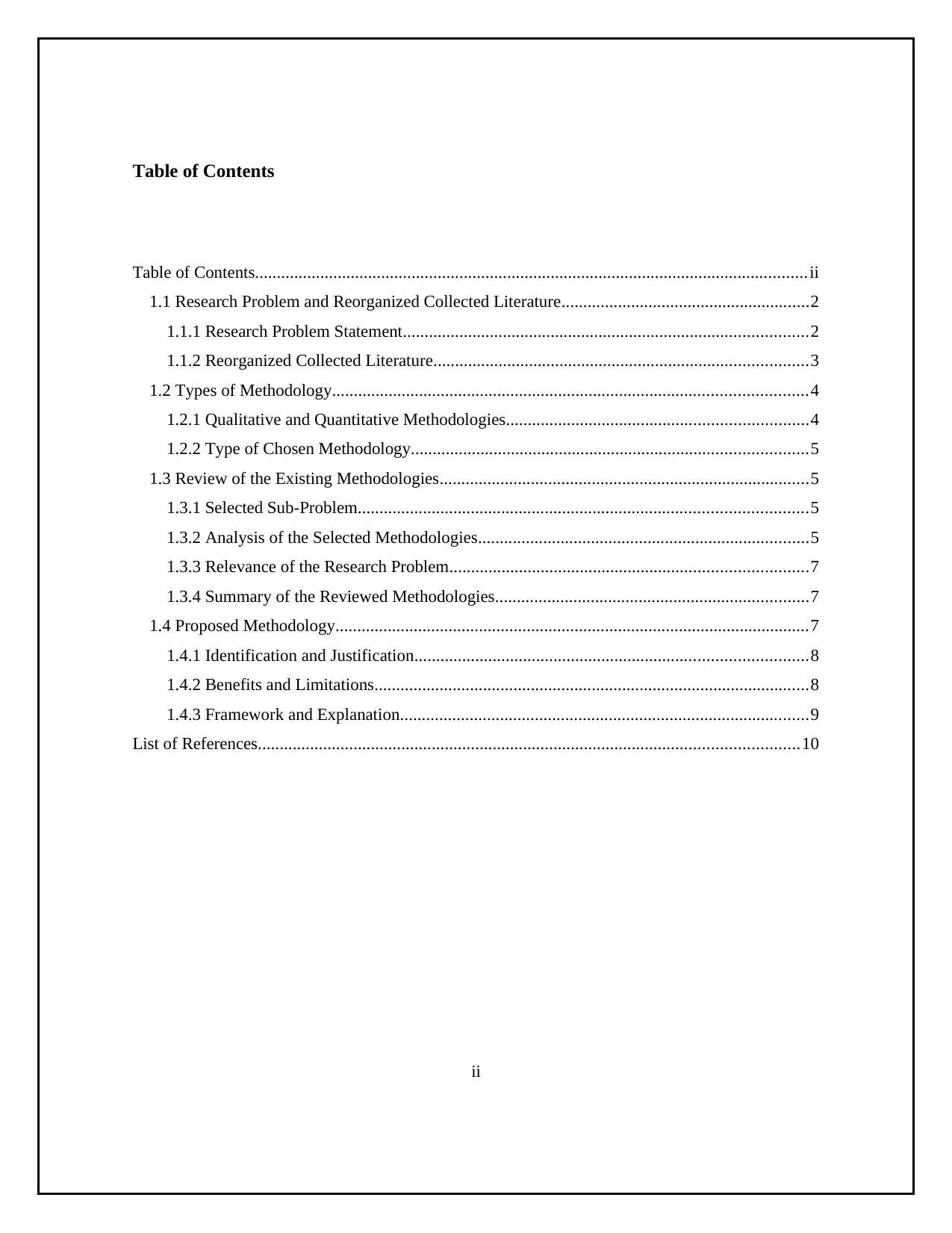
Table of Contents
Table of Contents...............................................................................................................................ii
1.1 Research Problem and Reorganized Collected Literature.........................................................2
1.1.1 Research Problem Statement.............................................................................................2
1.1.2 Reorganized Collected Literature......................................................................................3
1.2 Types of Methodology.............................................................................................................4
1.2.1 Qualitative and Quantitative Methodologies.....................................................................4
1.2.2 Type of Chosen Methodology...........................................................................................5
1.3 Review of the Existing Methodologies.....................................................................................5
1.3.1 Selected Sub-Problem.......................................................................................................5
1.3.2 Analysis of the Selected Methodologies............................................................................5
1.3.3 Relevance of the Research Problem..................................................................................7
1.3.4 Summary of the Reviewed Methodologies........................................................................7
1.4 Proposed Methodology.............................................................................................................7
1.4.1 Identification and Justification..........................................................................................8
1.4.2 Benefits and Limitations....................................................................................................8
1.4.3 Framework and Explanation..............................................................................................9
List of References............................................................................................................................10
ii
Table of Contents...............................................................................................................................ii
1.1 Research Problem and Reorganized Collected Literature.........................................................2
1.1.1 Research Problem Statement.............................................................................................2
1.1.2 Reorganized Collected Literature......................................................................................3
1.2 Types of Methodology.............................................................................................................4
1.2.1 Qualitative and Quantitative Methodologies.....................................................................4
1.2.2 Type of Chosen Methodology...........................................................................................5
1.3 Review of the Existing Methodologies.....................................................................................5
1.3.1 Selected Sub-Problem.......................................................................................................5
1.3.2 Analysis of the Selected Methodologies............................................................................5
1.3.3 Relevance of the Research Problem..................................................................................7
1.3.4 Summary of the Reviewed Methodologies........................................................................7
1.4 Proposed Methodology.............................................................................................................7
1.4.1 Identification and Justification..........................................................................................8
1.4.2 Benefits and Limitations....................................................................................................8
1.4.3 Framework and Explanation..............................................................................................9
List of References............................................................................................................................10
ii
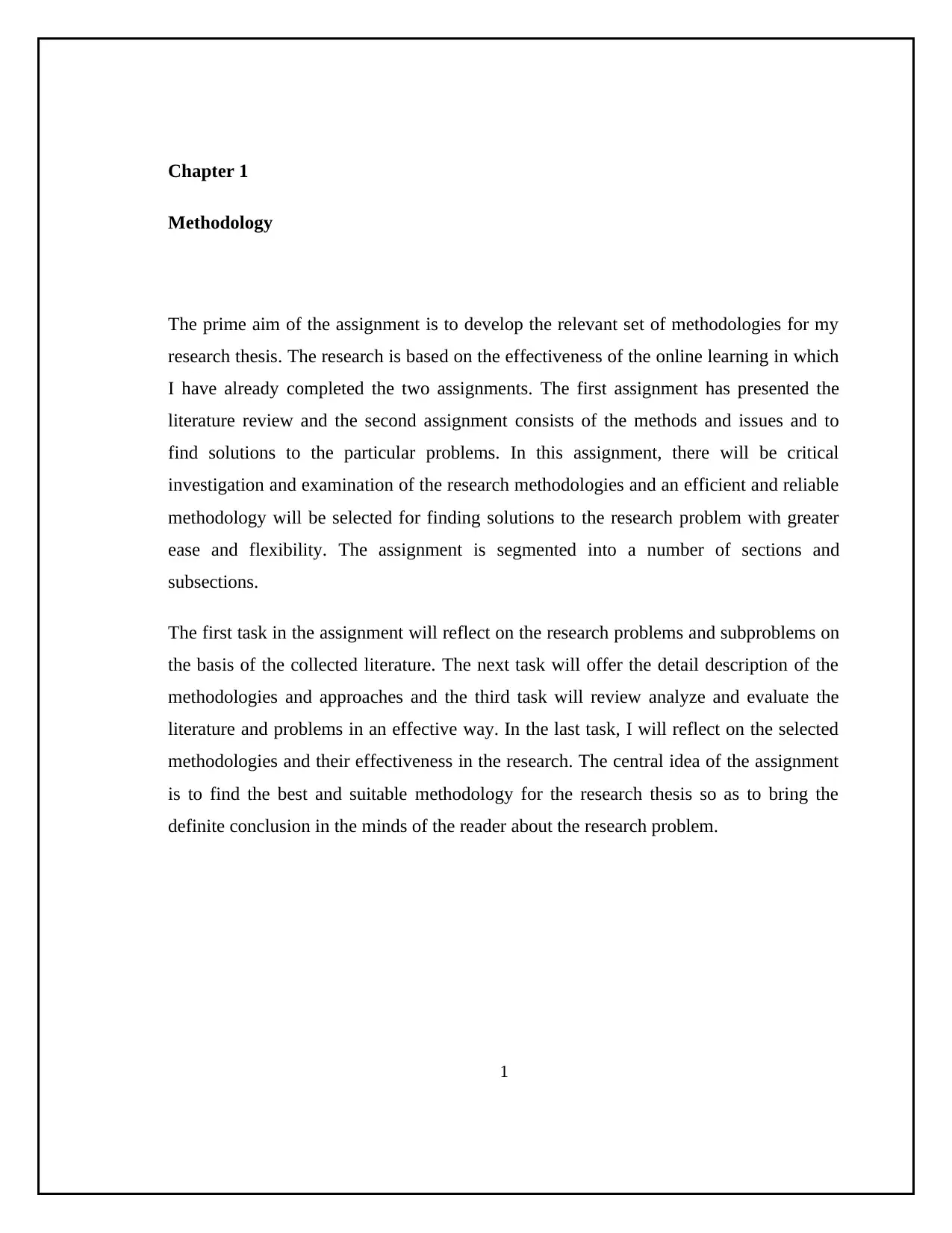
Chapter 1
Methodology
The prime aim of the assignment is to develop the relevant set of methodologies for my
research thesis. The research is based on the effectiveness of the online learning in which
I have already completed the two assignments. The first assignment has presented the
literature review and the second assignment consists of the methods and issues and to
find solutions to the particular problems. In this assignment, there will be critical
investigation and examination of the research methodologies and an efficient and reliable
methodology will be selected for finding solutions to the research problem with greater
ease and flexibility. The assignment is segmented into a number of sections and
subsections.
The first task in the assignment will reflect on the research problems and subproblems on
the basis of the collected literature. The next task will offer the detail description of the
methodologies and approaches and the third task will review analyze and evaluate the
literature and problems in an effective way. In the last task, I will reflect on the selected
methodologies and their effectiveness in the research. The central idea of the assignment
is to find the best and suitable methodology for the research thesis so as to bring the
definite conclusion in the minds of the reader about the research problem.
1
Methodology
The prime aim of the assignment is to develop the relevant set of methodologies for my
research thesis. The research is based on the effectiveness of the online learning in which
I have already completed the two assignments. The first assignment has presented the
literature review and the second assignment consists of the methods and issues and to
find solutions to the particular problems. In this assignment, there will be critical
investigation and examination of the research methodologies and an efficient and reliable
methodology will be selected for finding solutions to the research problem with greater
ease and flexibility. The assignment is segmented into a number of sections and
subsections.
The first task in the assignment will reflect on the research problems and subproblems on
the basis of the collected literature. The next task will offer the detail description of the
methodologies and approaches and the third task will review analyze and evaluate the
literature and problems in an effective way. In the last task, I will reflect on the selected
methodologies and their effectiveness in the research. The central idea of the assignment
is to find the best and suitable methodology for the research thesis so as to bring the
definite conclusion in the minds of the reader about the research problem.
1
⊘ This is a preview!⊘
Do you want full access?
Subscribe today to unlock all pages.

Trusted by 1+ million students worldwide
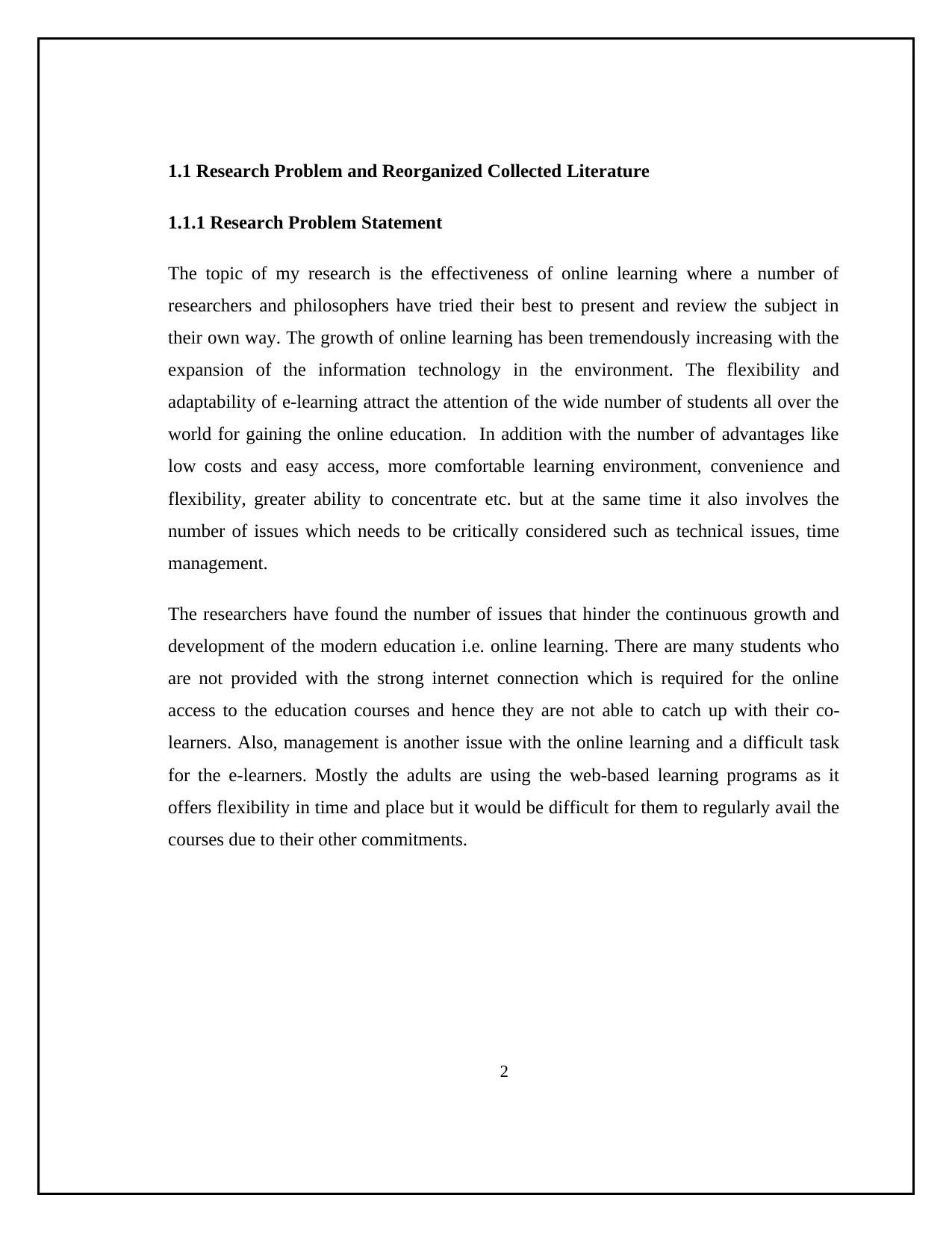
1.1 Research Problem and Reorganized Collected Literature
1.1.1 Research Problem Statement
The topic of my research is the effectiveness of online learning where a number of
researchers and philosophers have tried their best to present and review the subject in
their own way. The growth of online learning has been tremendously increasing with the
expansion of the information technology in the environment. The flexibility and
adaptability of e-learning attract the attention of the wide number of students all over the
world for gaining the online education. In addition with the number of advantages like
low costs and easy access, more comfortable learning environment, convenience and
flexibility, greater ability to concentrate etc. but at the same time it also involves the
number of issues which needs to be critically considered such as technical issues, time
management.
The researchers have found the number of issues that hinder the continuous growth and
development of the modern education i.e. online learning. There are many students who
are not provided with the strong internet connection which is required for the online
access to the education courses and hence they are not able to catch up with their co-
learners. Also, management is another issue with the online learning and a difficult task
for the e-learners. Mostly the adults are using the web-based learning programs as it
offers flexibility in time and place but it would be difficult for them to regularly avail the
courses due to their other commitments.
2
1.1.1 Research Problem Statement
The topic of my research is the effectiveness of online learning where a number of
researchers and philosophers have tried their best to present and review the subject in
their own way. The growth of online learning has been tremendously increasing with the
expansion of the information technology in the environment. The flexibility and
adaptability of e-learning attract the attention of the wide number of students all over the
world for gaining the online education. In addition with the number of advantages like
low costs and easy access, more comfortable learning environment, convenience and
flexibility, greater ability to concentrate etc. but at the same time it also involves the
number of issues which needs to be critically considered such as technical issues, time
management.
The researchers have found the number of issues that hinder the continuous growth and
development of the modern education i.e. online learning. There are many students who
are not provided with the strong internet connection which is required for the online
access to the education courses and hence they are not able to catch up with their co-
learners. Also, management is another issue with the online learning and a difficult task
for the e-learners. Mostly the adults are using the web-based learning programs as it
offers flexibility in time and place but it would be difficult for them to regularly avail the
courses due to their other commitments.
2
Paraphrase This Document
Need a fresh take? Get an instant paraphrase of this document with our AI Paraphraser
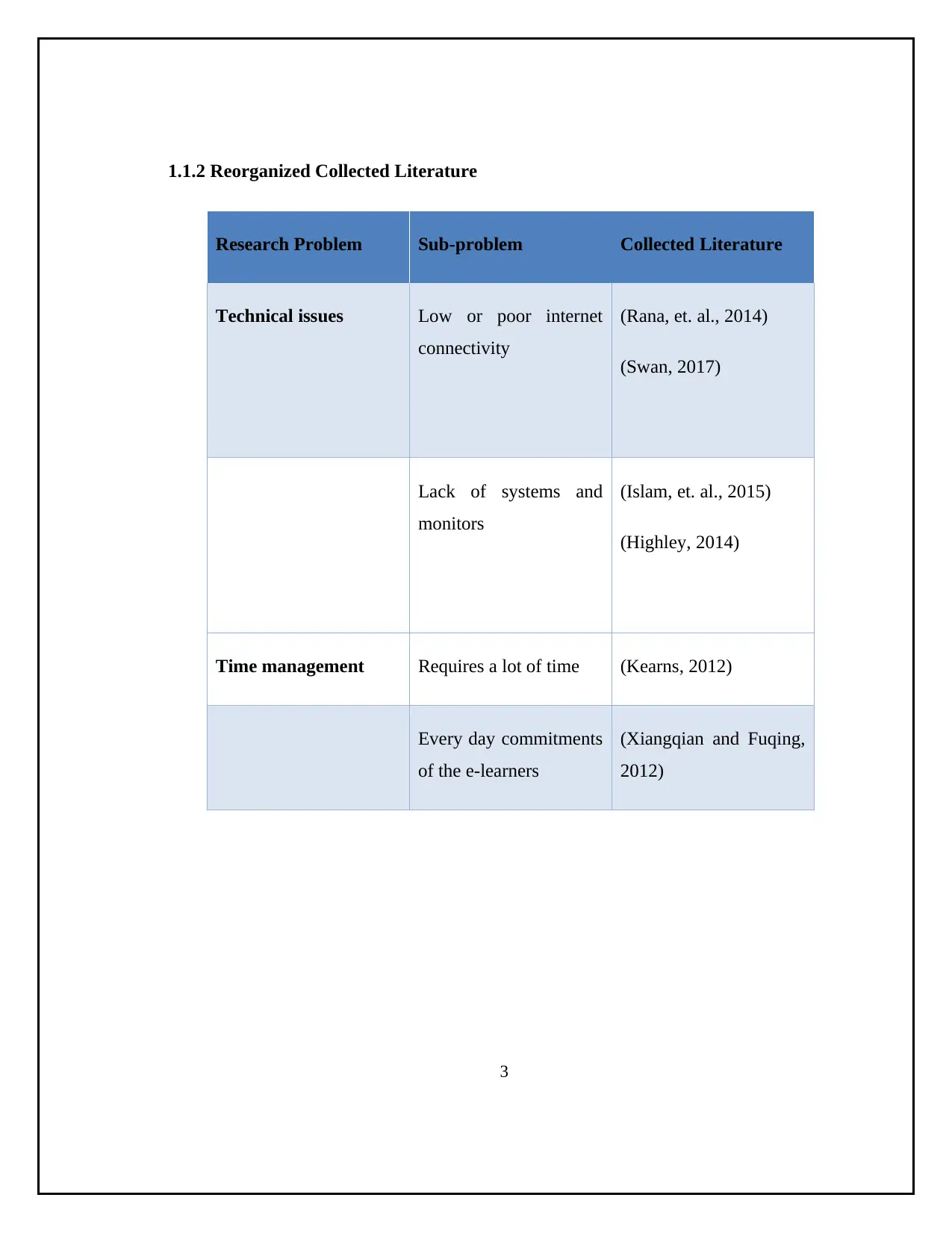
1.1.2 Reorganized Collected Literature
Research Problem Sub-problem Collected Literature
Technical issues Low or poor internet
connectivity
(Rana, et. al., 2014)
(Swan, 2017)
Lack of systems and
monitors
(Islam, et. al., 2015)
(Highley, 2014)
Time management Requires a lot of time (Kearns, 2012)
Every day commitments
of the e-learners
(Xiangqian and Fuqing,
2012)
3
Research Problem Sub-problem Collected Literature
Technical issues Low or poor internet
connectivity
(Rana, et. al., 2014)
(Swan, 2017)
Lack of systems and
monitors
(Islam, et. al., 2015)
(Highley, 2014)
Time management Requires a lot of time (Kearns, 2012)
Every day commitments
of the e-learners
(Xiangqian and Fuqing,
2012)
3
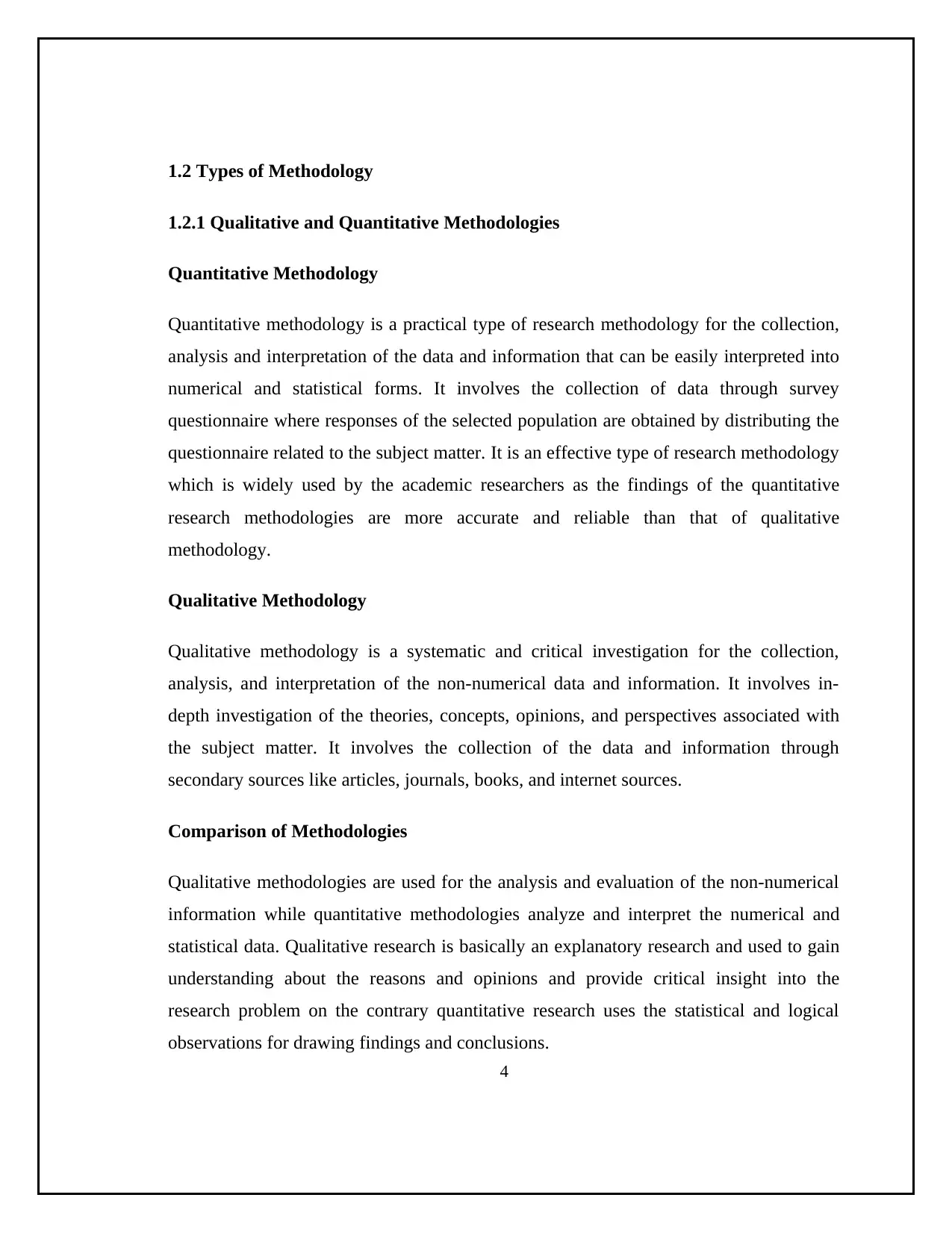
1.2 Types of Methodology
1.2.1 Qualitative and Quantitative Methodologies
Quantitative Methodology
Quantitative methodology is a practical type of research methodology for the collection,
analysis and interpretation of the data and information that can be easily interpreted into
numerical and statistical forms. It involves the collection of data through survey
questionnaire where responses of the selected population are obtained by distributing the
questionnaire related to the subject matter. It is an effective type of research methodology
which is widely used by the academic researchers as the findings of the quantitative
research methodologies are more accurate and reliable than that of qualitative
methodology.
Qualitative Methodology
Qualitative methodology is a systematic and critical investigation for the collection,
analysis, and interpretation of the non-numerical data and information. It involves in-
depth investigation of the theories, concepts, opinions, and perspectives associated with
the subject matter. It involves the collection of the data and information through
secondary sources like articles, journals, books, and internet sources.
Comparison of Methodologies
Qualitative methodologies are used for the analysis and evaluation of the non-numerical
information while quantitative methodologies analyze and interpret the numerical and
statistical data. Qualitative research is basically an explanatory research and used to gain
understanding about the reasons and opinions and provide critical insight into the
research problem on the contrary quantitative research uses the statistical and logical
observations for drawing findings and conclusions.
4
1.2.1 Qualitative and Quantitative Methodologies
Quantitative Methodology
Quantitative methodology is a practical type of research methodology for the collection,
analysis and interpretation of the data and information that can be easily interpreted into
numerical and statistical forms. It involves the collection of data through survey
questionnaire where responses of the selected population are obtained by distributing the
questionnaire related to the subject matter. It is an effective type of research methodology
which is widely used by the academic researchers as the findings of the quantitative
research methodologies are more accurate and reliable than that of qualitative
methodology.
Qualitative Methodology
Qualitative methodology is a systematic and critical investigation for the collection,
analysis, and interpretation of the non-numerical data and information. It involves in-
depth investigation of the theories, concepts, opinions, and perspectives associated with
the subject matter. It involves the collection of the data and information through
secondary sources like articles, journals, books, and internet sources.
Comparison of Methodologies
Qualitative methodologies are used for the analysis and evaluation of the non-numerical
information while quantitative methodologies analyze and interpret the numerical and
statistical data. Qualitative research is basically an explanatory research and used to gain
understanding about the reasons and opinions and provide critical insight into the
research problem on the contrary quantitative research uses the statistical and logical
observations for drawing findings and conclusions.
4
⊘ This is a preview!⊘
Do you want full access?
Subscribe today to unlock all pages.

Trusted by 1+ million students worldwide
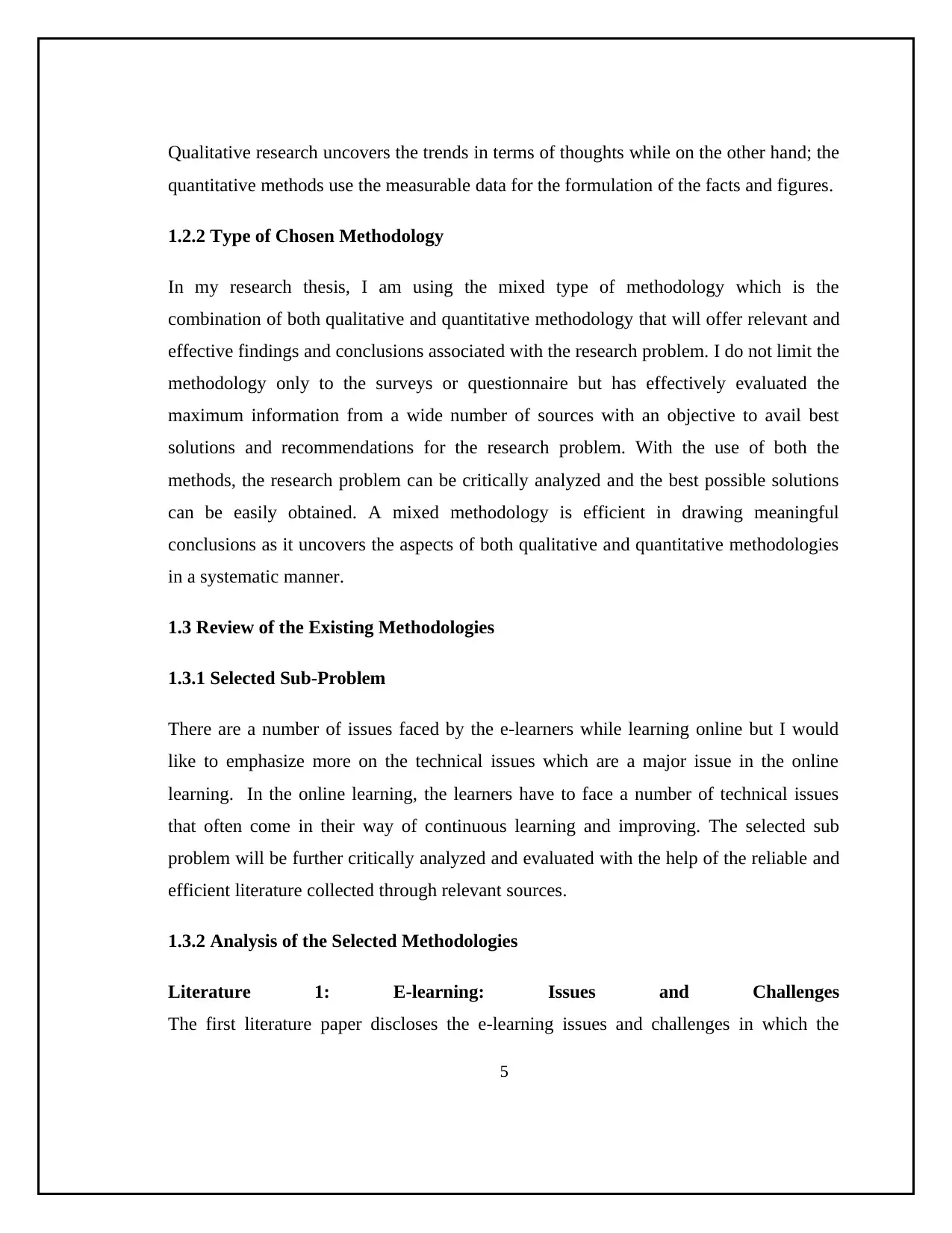
Qualitative research uncovers the trends in terms of thoughts while on the other hand; the
quantitative methods use the measurable data for the formulation of the facts and figures.
1.2.2 Type of Chosen Methodology
In my research thesis, I am using the mixed type of methodology which is the
combination of both qualitative and quantitative methodology that will offer relevant and
effective findings and conclusions associated with the research problem. I do not limit the
methodology only to the surveys or questionnaire but has effectively evaluated the
maximum information from a wide number of sources with an objective to avail best
solutions and recommendations for the research problem. With the use of both the
methods, the research problem can be critically analyzed and the best possible solutions
can be easily obtained. A mixed methodology is efficient in drawing meaningful
conclusions as it uncovers the aspects of both qualitative and quantitative methodologies
in a systematic manner.
1.3 Review of the Existing Methodologies
1.3.1 Selected Sub-Problem
There are a number of issues faced by the e-learners while learning online but I would
like to emphasize more on the technical issues which are a major issue in the online
learning. In the online learning, the learners have to face a number of technical issues
that often come in their way of continuous learning and improving. The selected sub
problem will be further critically analyzed and evaluated with the help of the reliable and
efficient literature collected through relevant sources.
1.3.2 Analysis of the Selected Methodologies
Literature 1: E-learning: Issues and Challenges
The first literature paper discloses the e-learning issues and challenges in which the
5
quantitative methods use the measurable data for the formulation of the facts and figures.
1.2.2 Type of Chosen Methodology
In my research thesis, I am using the mixed type of methodology which is the
combination of both qualitative and quantitative methodology that will offer relevant and
effective findings and conclusions associated with the research problem. I do not limit the
methodology only to the surveys or questionnaire but has effectively evaluated the
maximum information from a wide number of sources with an objective to avail best
solutions and recommendations for the research problem. With the use of both the
methods, the research problem can be critically analyzed and the best possible solutions
can be easily obtained. A mixed methodology is efficient in drawing meaningful
conclusions as it uncovers the aspects of both qualitative and quantitative methodologies
in a systematic manner.
1.3 Review of the Existing Methodologies
1.3.1 Selected Sub-Problem
There are a number of issues faced by the e-learners while learning online but I would
like to emphasize more on the technical issues which are a major issue in the online
learning. In the online learning, the learners have to face a number of technical issues
that often come in their way of continuous learning and improving. The selected sub
problem will be further critically analyzed and evaluated with the help of the reliable and
efficient literature collected through relevant sources.
1.3.2 Analysis of the Selected Methodologies
Literature 1: E-learning: Issues and Challenges
The first literature paper discloses the e-learning issues and challenges in which the
5
Paraphrase This Document
Need a fresh take? Get an instant paraphrase of this document with our AI Paraphraser
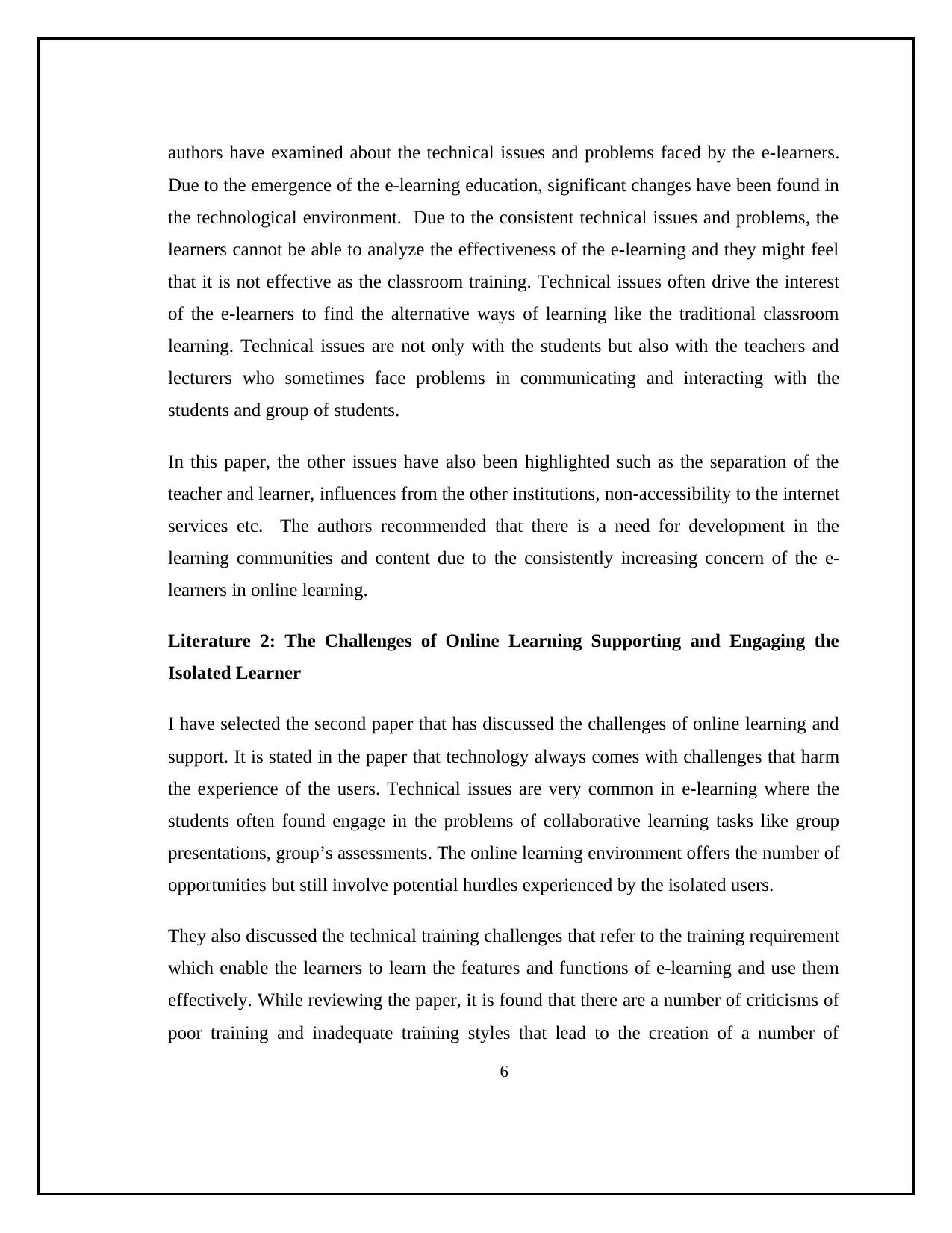
authors have examined about the technical issues and problems faced by the e-learners.
Due to the emergence of the e-learning education, significant changes have been found in
the technological environment. Due to the consistent technical issues and problems, the
learners cannot be able to analyze the effectiveness of the e-learning and they might feel
that it is not effective as the classroom training. Technical issues often drive the interest
of the e-learners to find the alternative ways of learning like the traditional classroom
learning. Technical issues are not only with the students but also with the teachers and
lecturers who sometimes face problems in communicating and interacting with the
students and group of students.
In this paper, the other issues have also been highlighted such as the separation of the
teacher and learner, influences from the other institutions, non-accessibility to the internet
services etc. The authors recommended that there is a need for development in the
learning communities and content due to the consistently increasing concern of the e-
learners in online learning.
Literature 2: The Challenges of Online Learning Supporting and Engaging the
Isolated Learner
I have selected the second paper that has discussed the challenges of online learning and
support. It is stated in the paper that technology always comes with challenges that harm
the experience of the users. Technical issues are very common in e-learning where the
students often found engage in the problems of collaborative learning tasks like group
presentations, group’s assessments. The online learning environment offers the number of
opportunities but still involve potential hurdles experienced by the isolated users.
They also discussed the technical training challenges that refer to the training requirement
which enable the learners to learn the features and functions of e-learning and use them
effectively. While reviewing the paper, it is found that there are a number of criticisms of
poor training and inadequate training styles that lead to the creation of a number of
6
Due to the emergence of the e-learning education, significant changes have been found in
the technological environment. Due to the consistent technical issues and problems, the
learners cannot be able to analyze the effectiveness of the e-learning and they might feel
that it is not effective as the classroom training. Technical issues often drive the interest
of the e-learners to find the alternative ways of learning like the traditional classroom
learning. Technical issues are not only with the students but also with the teachers and
lecturers who sometimes face problems in communicating and interacting with the
students and group of students.
In this paper, the other issues have also been highlighted such as the separation of the
teacher and learner, influences from the other institutions, non-accessibility to the internet
services etc. The authors recommended that there is a need for development in the
learning communities and content due to the consistently increasing concern of the e-
learners in online learning.
Literature 2: The Challenges of Online Learning Supporting and Engaging the
Isolated Learner
I have selected the second paper that has discussed the challenges of online learning and
support. It is stated in the paper that technology always comes with challenges that harm
the experience of the users. Technical issues are very common in e-learning where the
students often found engage in the problems of collaborative learning tasks like group
presentations, group’s assessments. The online learning environment offers the number of
opportunities but still involve potential hurdles experienced by the isolated users.
They also discussed the technical training challenges that refer to the training requirement
which enable the learners to learn the features and functions of e-learning and use them
effectively. While reviewing the paper, it is found that there are a number of criticisms of
poor training and inadequate training styles that lead to the creation of a number of
6
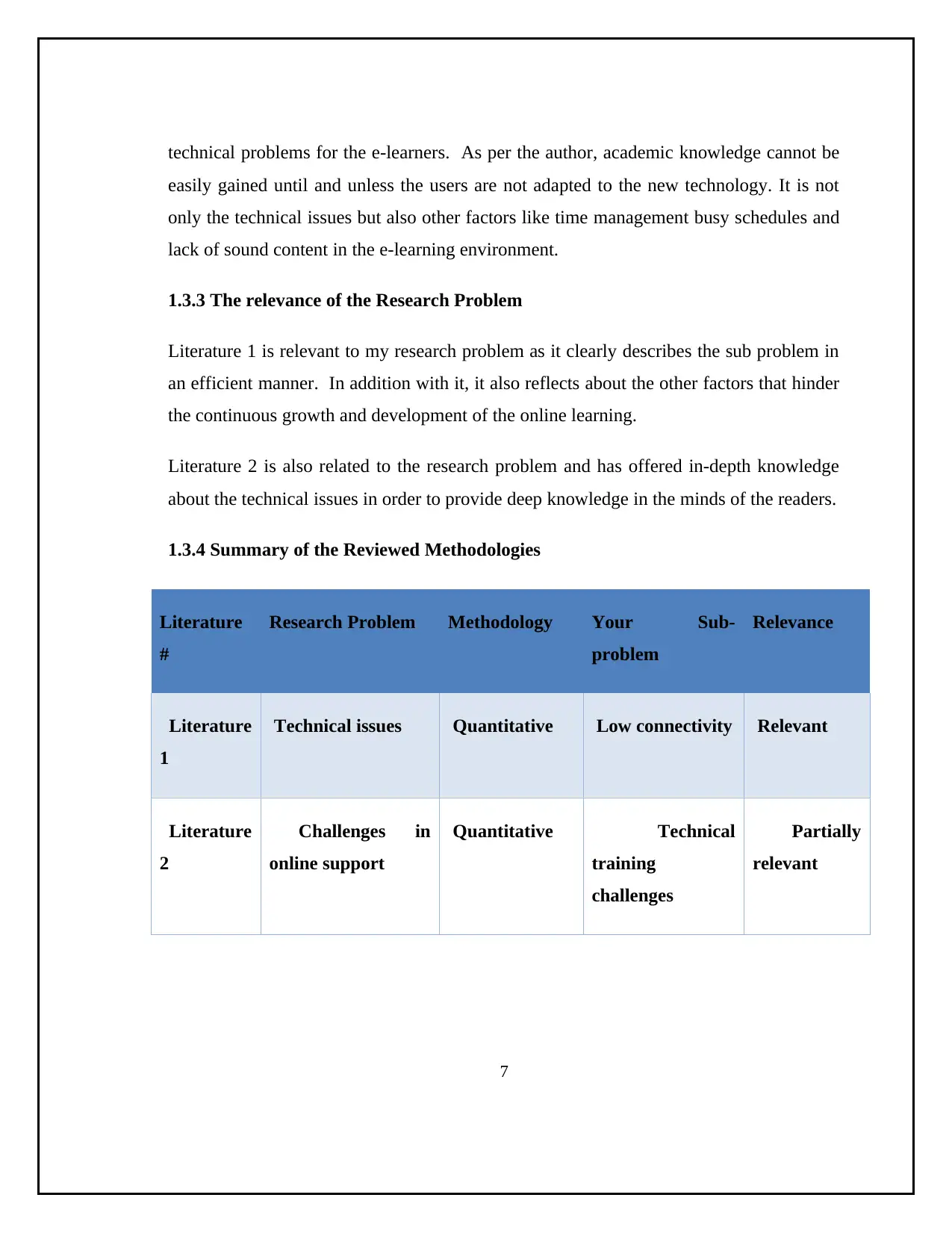
technical problems for the e-learners. As per the author, academic knowledge cannot be
easily gained until and unless the users are not adapted to the new technology. It is not
only the technical issues but also other factors like time management busy schedules and
lack of sound content in the e-learning environment.
1.3.3 The relevance of the Research Problem
Literature 1 is relevant to my research problem as it clearly describes the sub problem in
an efficient manner. In addition with it, it also reflects about the other factors that hinder
the continuous growth and development of the online learning.
Literature 2 is also related to the research problem and has offered in-depth knowledge
about the technical issues in order to provide deep knowledge in the minds of the readers.
1.3.4 Summary of the Reviewed Methodologies
Literature
#
Research Problem Methodology Your Sub-
problem
Relevance
Literature
1
Technical issues Quantitative Low connectivity Relevant
Literature
2
Challenges in
online support
Quantitative Technical
training
challenges
Partially
relevant
7
easily gained until and unless the users are not adapted to the new technology. It is not
only the technical issues but also other factors like time management busy schedules and
lack of sound content in the e-learning environment.
1.3.3 The relevance of the Research Problem
Literature 1 is relevant to my research problem as it clearly describes the sub problem in
an efficient manner. In addition with it, it also reflects about the other factors that hinder
the continuous growth and development of the online learning.
Literature 2 is also related to the research problem and has offered in-depth knowledge
about the technical issues in order to provide deep knowledge in the minds of the readers.
1.3.4 Summary of the Reviewed Methodologies
Literature
#
Research Problem Methodology Your Sub-
problem
Relevance
Literature
1
Technical issues Quantitative Low connectivity Relevant
Literature
2
Challenges in
online support
Quantitative Technical
training
challenges
Partially
relevant
7
⊘ This is a preview!⊘
Do you want full access?
Subscribe today to unlock all pages.

Trusted by 1+ million students worldwide
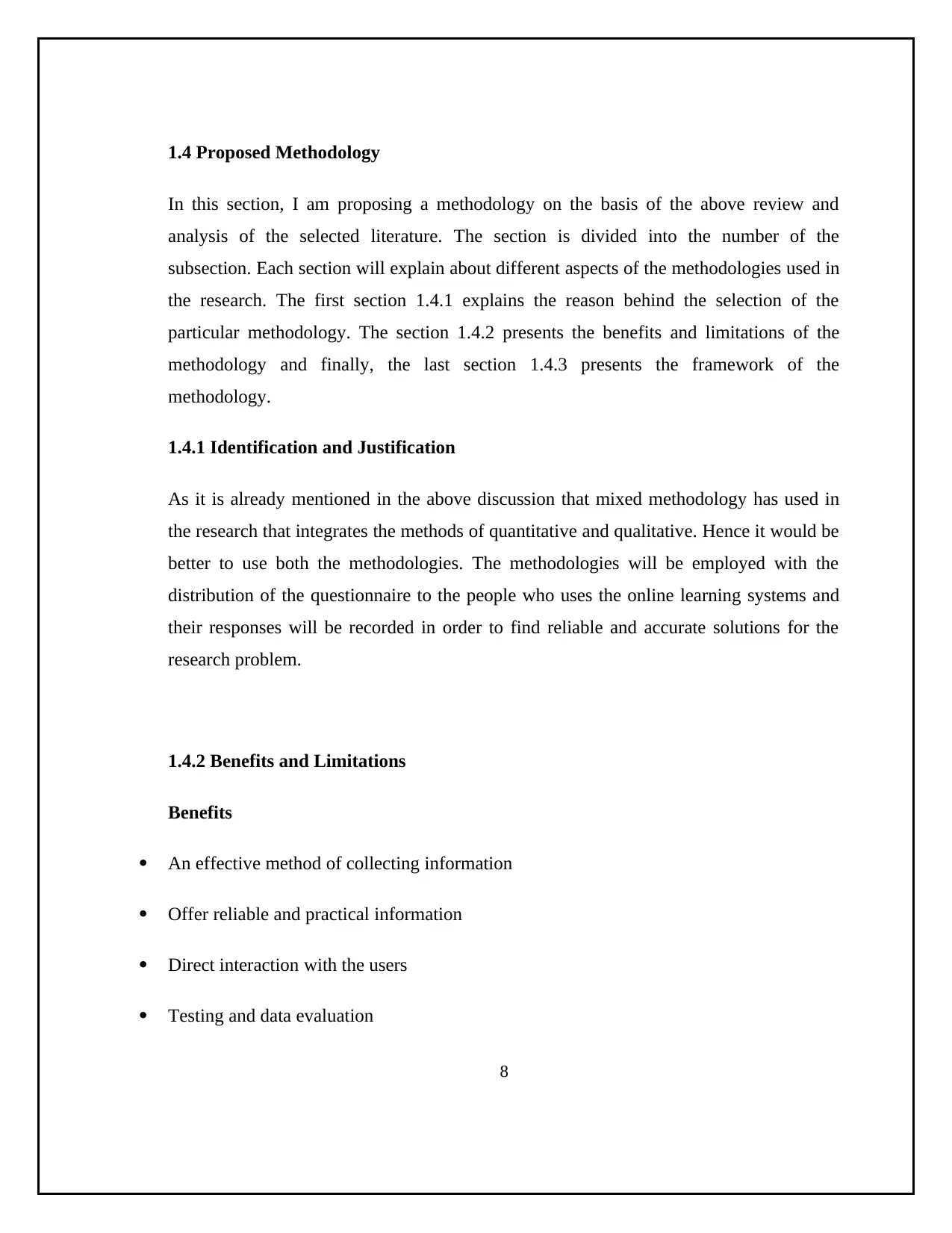
1.4 Proposed Methodology
In this section, I am proposing a methodology on the basis of the above review and
analysis of the selected literature. The section is divided into the number of the
subsection. Each section will explain about different aspects of the methodologies used in
the research. The first section 1.4.1 explains the reason behind the selection of the
particular methodology. The section 1.4.2 presents the benefits and limitations of the
methodology and finally, the last section 1.4.3 presents the framework of the
methodology.
1.4.1 Identification and Justification
As it is already mentioned in the above discussion that mixed methodology has used in
the research that integrates the methods of quantitative and qualitative. Hence it would be
better to use both the methodologies. The methodologies will be employed with the
distribution of the questionnaire to the people who uses the online learning systems and
their responses will be recorded in order to find reliable and accurate solutions for the
research problem.
1.4.2 Benefits and Limitations
Benefits
An effective method of collecting information
Offer reliable and practical information
Direct interaction with the users
Testing and data evaluation
8
In this section, I am proposing a methodology on the basis of the above review and
analysis of the selected literature. The section is divided into the number of the
subsection. Each section will explain about different aspects of the methodologies used in
the research. The first section 1.4.1 explains the reason behind the selection of the
particular methodology. The section 1.4.2 presents the benefits and limitations of the
methodology and finally, the last section 1.4.3 presents the framework of the
methodology.
1.4.1 Identification and Justification
As it is already mentioned in the above discussion that mixed methodology has used in
the research that integrates the methods of quantitative and qualitative. Hence it would be
better to use both the methodologies. The methodologies will be employed with the
distribution of the questionnaire to the people who uses the online learning systems and
their responses will be recorded in order to find reliable and accurate solutions for the
research problem.
1.4.2 Benefits and Limitations
Benefits
An effective method of collecting information
Offer reliable and practical information
Direct interaction with the users
Testing and data evaluation
8
Paraphrase This Document
Need a fresh take? Get an instant paraphrase of this document with our AI Paraphraser
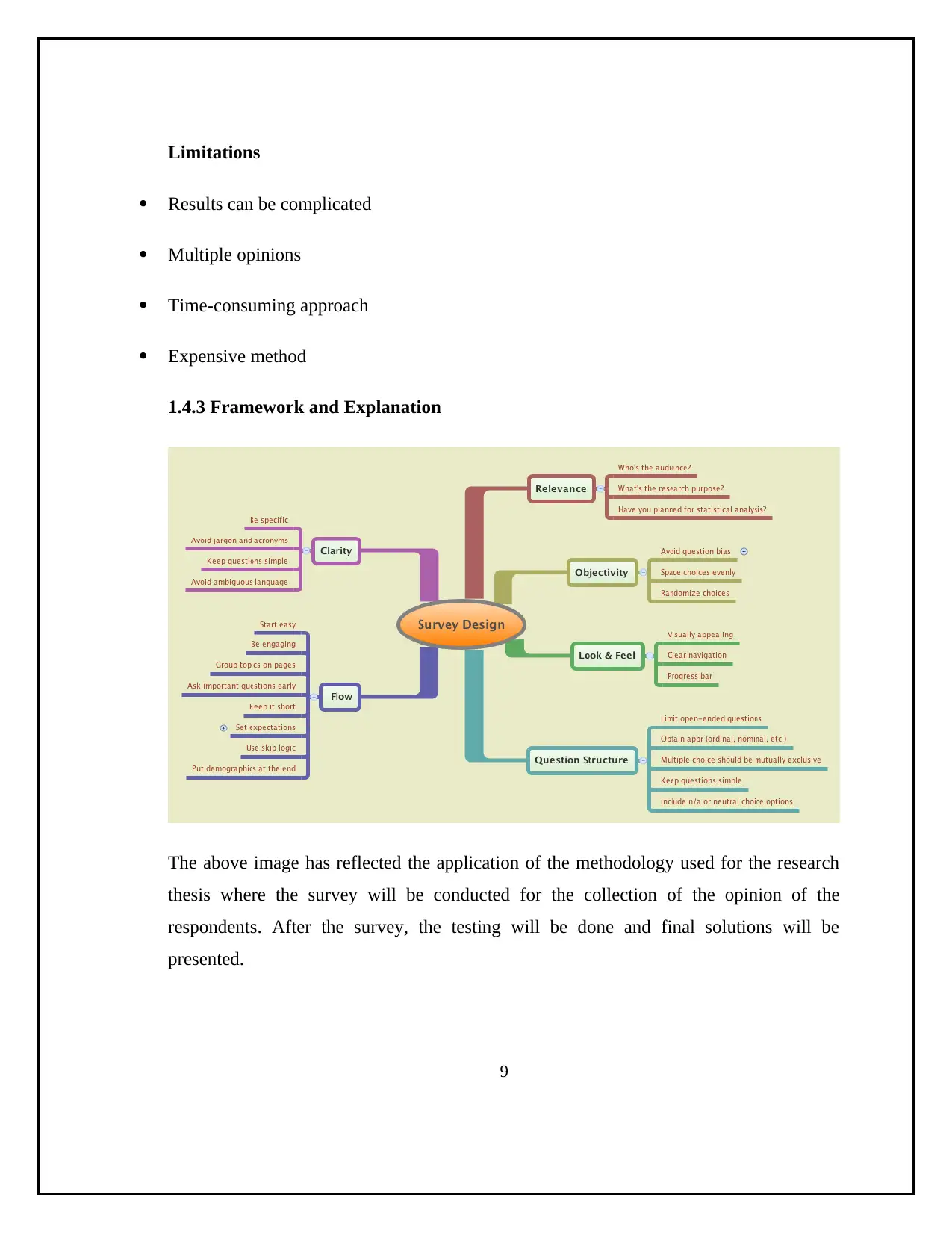
Limitations
Results can be complicated
Multiple opinions
Time-consuming approach
Expensive method
1.4.3 Framework and Explanation
The above image has reflected the application of the methodology used for the research
thesis where the survey will be conducted for the collection of the opinion of the
respondents. After the survey, the testing will be done and final solutions will be
presented.
9
Results can be complicated
Multiple opinions
Time-consuming approach
Expensive method
1.4.3 Framework and Explanation
The above image has reflected the application of the methodology used for the research
thesis where the survey will be conducted for the collection of the opinion of the
respondents. After the survey, the testing will be done and final solutions will be
presented.
9
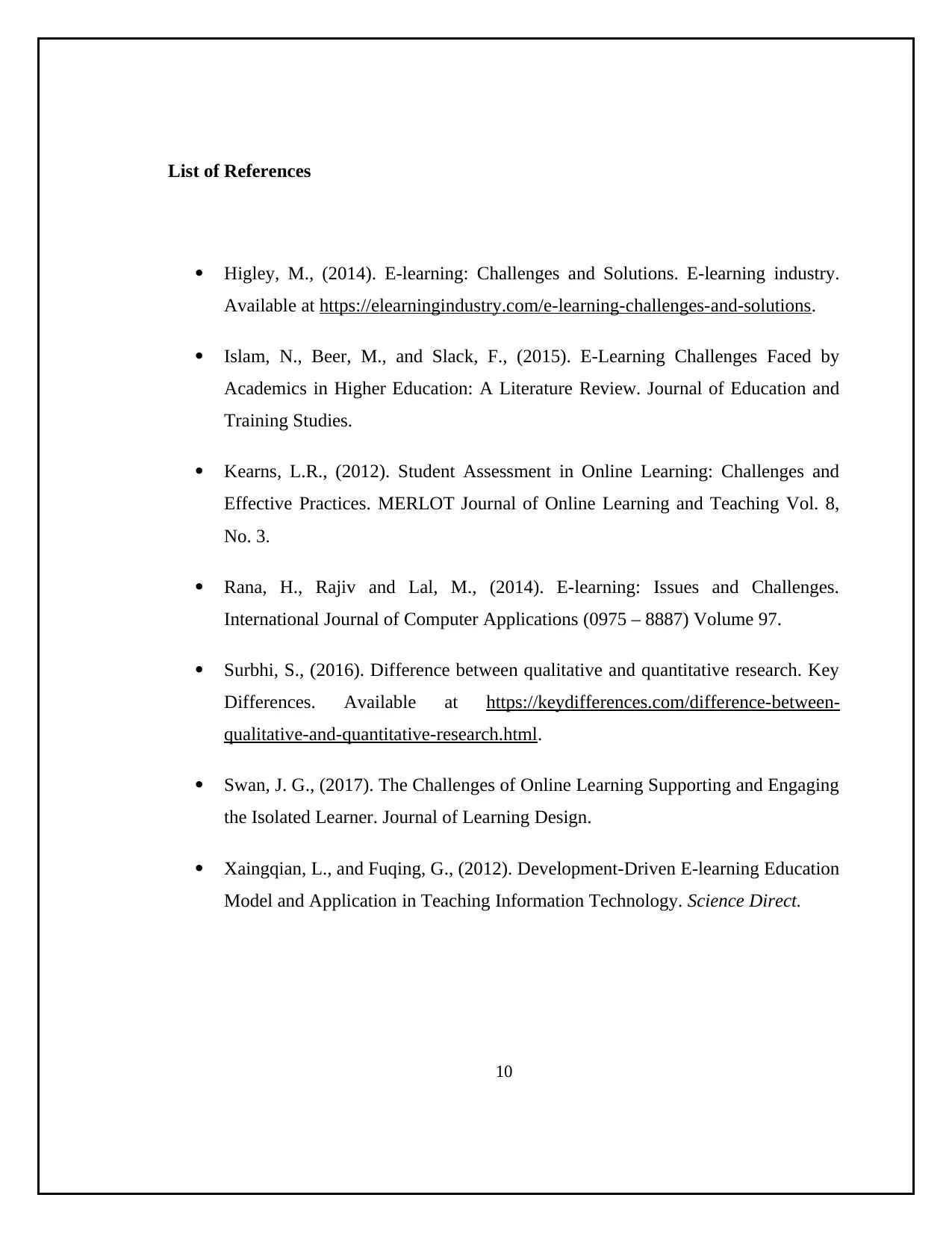
List of References
Higley, M., (2014). E-learning: Challenges and Solutions. E-learning industry.
Available at https://elearningindustry.com/e-learning-challenges-and-solutions.
Islam, N., Beer, M., and Slack, F., (2015). E-Learning Challenges Faced by
Academics in Higher Education: A Literature Review. Journal of Education and
Training Studies.
Kearns, L.R., (2012). Student Assessment in Online Learning: Challenges and
Effective Practices. MERLOT Journal of Online Learning and Teaching Vol. 8,
No. 3.
Rana, H., Rajiv and Lal, M., (2014). E-learning: Issues and Challenges.
International Journal of Computer Applications (0975 – 8887) Volume 97.
Surbhi, S., (2016). Difference between qualitative and quantitative research. Key
Differences. Available at https://keydifferences.com/difference-between-
qualitative-and-quantitative-research.html.
Swan, J. G., (2017). The Challenges of Online Learning Supporting and Engaging
the Isolated Learner. Journal of Learning Design.
Xaingqian, L., and Fuqing, G., (2012). Development-Driven E-learning Education
Model and Application in Teaching Information Technology. Science Direct.
10
Higley, M., (2014). E-learning: Challenges and Solutions. E-learning industry.
Available at https://elearningindustry.com/e-learning-challenges-and-solutions.
Islam, N., Beer, M., and Slack, F., (2015). E-Learning Challenges Faced by
Academics in Higher Education: A Literature Review. Journal of Education and
Training Studies.
Kearns, L.R., (2012). Student Assessment in Online Learning: Challenges and
Effective Practices. MERLOT Journal of Online Learning and Teaching Vol. 8,
No. 3.
Rana, H., Rajiv and Lal, M., (2014). E-learning: Issues and Challenges.
International Journal of Computer Applications (0975 – 8887) Volume 97.
Surbhi, S., (2016). Difference between qualitative and quantitative research. Key
Differences. Available at https://keydifferences.com/difference-between-
qualitative-and-quantitative-research.html.
Swan, J. G., (2017). The Challenges of Online Learning Supporting and Engaging
the Isolated Learner. Journal of Learning Design.
Xaingqian, L., and Fuqing, G., (2012). Development-Driven E-learning Education
Model and Application in Teaching Information Technology. Science Direct.
10
⊘ This is a preview!⊘
Do you want full access?
Subscribe today to unlock all pages.

Trusted by 1+ million students worldwide
1 out of 12
Related Documents
Your All-in-One AI-Powered Toolkit for Academic Success.
+13062052269
info@desklib.com
Available 24*7 on WhatsApp / Email
![[object Object]](/_next/static/media/star-bottom.7253800d.svg)
Unlock your academic potential
Copyright © 2020–2026 A2Z Services. All Rights Reserved. Developed and managed by ZUCOL.





